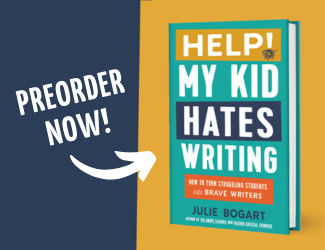Movie Wednesday: Penelope

by Amy Frantz, Brave Writer alum
Generations ago, the “blue blood” Wilhern family was cursed by a witch so that the next born Wilhern daughter would have the face of a pig. The curse can only be broken if “one of their own,” another blue blood, learns to love her.
Five generations later, the Wilhern family finally has a daughter and the curse comes true. Penelope is born with the face of a pig. Her well-meaning mother fakes Penelope’s death and removes her daughter from the prying eyes of the world, locking Penelope in the family home.
Now Penelope is a young woman and her mother is determined to break the curse. But suitor after suitor flees from the sight of her face, until one day she meets an unlikely young man who seems different. But when that too ends in heartbreak, Penelope runs away from the home that has been her prison and sets out into the world on a journey of self-discovery and acceptance.
[This post contains Amazon affiliate links. When you click on those links to make purchases,
Brave Writer receives compensation at no extra cost to you. Thank you!]
Penelope is a 2006 modern fairy tale and is loosely inspired by the story of Beauty and the Beast with the genders of the main characters reversed as a twist.
Modern fairy tales are stories with a contemporary setting which use narrative elements or story structures that we associate with fairy tales. In the case of Penelope, there is the obvious element of the family cursed by a witch. But the character of Penelope is also “a girl in a tower.” Although Penelope’s is not a literal tower, the trope of a girl being shut away from the world due to a curse or enchantment is a common one found in fairy tales.
Discussion Questions
- The story of Penelope uses many familiar fairy tale elements. Other than the Beauty and the Beast parallels, what other things did you find in the film that reminded you of particular fairy tales?
- The key to breaking Penelope’s curse is self-acceptance and self-love. What do you think the film might be saying about fairy tales where the curse must be broken by seeking love from others instead?
- One of the children at the end of the film opines that it’s “always the mother’s fault.” Do you agree that it was all Penelope’s mother’s fault? Why or why not?
- Music plays an important role in the film. Did you have a favorite musical moment? If so, which one?
Additional Resources
Penelope is streaming on Netflix
Amy Frantz is a Brave Writer alum. When not over-analyzing Star Wars, she has many feelings about contemporary fairy tale retellings.


















